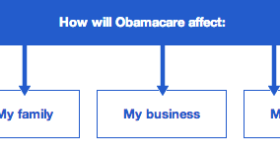Second Opinion is a weekly Q-and-A series that answers questions from San Diegans on the Affordable Care Act. Ask yours here.
The Question: Can people with pre-existing conditions get better premium rates under the Affordable Care Act?
Tamara Kaplan lives in an art-filled home in University Heights. She's currently spending $1,300 a month on her health insurance premium because of a pre-existing condition.
She has a bad back and has had six surgeries on it. She says she can handle the back pain just fine, but wants to know if her wallet will get any relief under the Affordable Care Act.
Here's Kaplan's question:
"I'm currently paying 25 percent of my income for my medical insurance. My premiums are high because I have a pre-existing condition. I'm wondering if the Affordable Care Act will give me more options in obtaining a different rate and maybe a different insurance provider."
The Takeaway: Costs will decrease for people with pre-existing conditions.
The health reform law is pretty straightforward on this: Insurance providers can no longer turn you down because of a pre-existing condition, and they can't charge you more because of one. Here's how the White House puts it:
A group health plan and a health insurance issuer offering group or individual health insurance coverage may not establish rules for eligibility (including continued eligibility) of any individual to enroll under the terms of the plan or coverage based on any of the following health status-related factors in relation to the individual or a dependent of the individual:
- Health status
- Medical condition (including both physical and mental illnesses)
- Claims experience
- Receipt of health care
- Medical history
- Genetic information
- Evidence of insurability (including conditions arising out of acts of domestic violence)
- Disability
- Any other health status-related factor determined appropriate by the Secretary
Insurance rates can vary by region (you can look at rates by health region here) and age, though the law says older individuals can't be charged more than three times what young adults pay. The law also says rates can be higher for smokers, but California has opted out of that provision.
So what will Kaplan's savings look like?
If she goes onto Covered California Tuesday to apply for coverage, she'll find that she really only has to tell them her age, income and ZIP code. A preliminary estimate for her – she's in her 60s and earns more than $44,680, the cutoff point for premium assistance – shows she could end up paying between $500 and $700 a month, depending on the level of coverage she wants.
I looked at similar plans through a private exchange and the rates are about the same. So either way, she'll see a drastic improvement.
If she uses Covered California, Kaplan might want to consider going higher on its list of precious metals. Its bronze plans are like catastrophic plans because many of the services offered are subject to a high deductible. Plans on the silver, gold and platinum shelves have lower deductibles and the majority of the co-pays count toward an annual out-of-pocket maximum, which brings up one more way Kaplan could save under Obamacare.
The Affordable Care Act places a cap on out-of-pocket expenses — $6,350 for individuals and $12,700 for families. Covered California plans will have these caps in place next year. Small group plans and policies with separate drug plans should get them in 2015. Grandfathered plans aren't subject to the cap.
The Orders: Find a plan you like, then drop the one you don't like.
Because Kaplan won't qualify for a premium assistance subsidy, it really doesn't matter whether she buys a plan though Covered California or the private market. She should compare prices and choose what's best for her.
If she chooses Covered California, she won't begin seeing savings until the plan kicks in next year.
And insurance experts say she shouldn't drop the old plan until she knows the new one is a sure thing.
Check out last week's Second Opinion: I'm nearing Medicare age. Can I get gap coverage?









